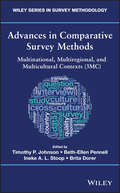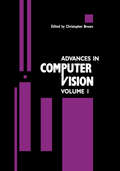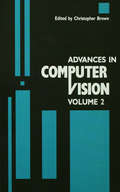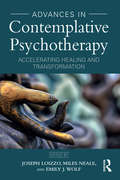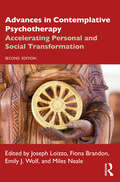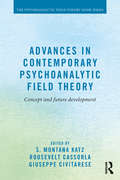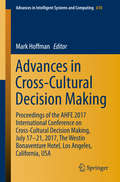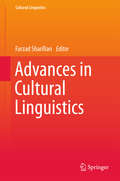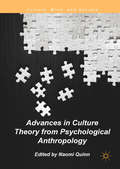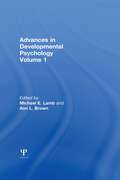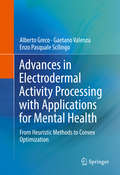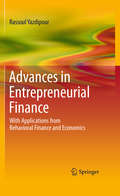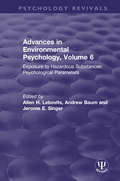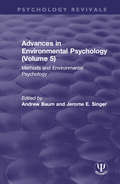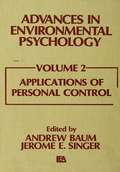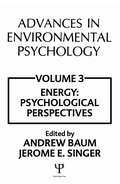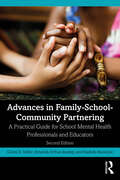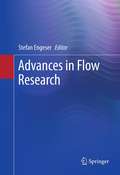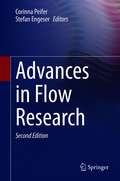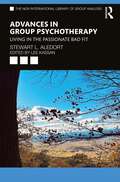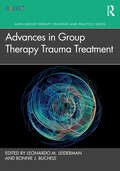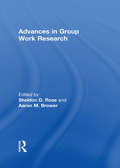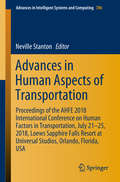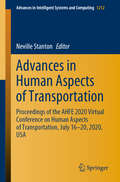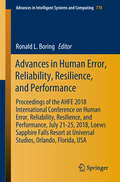- Table View
- List View
Advances in Comparative Survey Methods: Multinational, Multiregional, and Multicultural Contexts (3MC) (Wiley Series in Survey Methodology)
by Timothy P. Johnson Beth-Ellen Pennell Ineke A. Stoop Brita DorerCovers the latest methodologies and research on international comparative surveys with contributions from noted experts in the field Advances in Comparative Survey Methodology examines the most recent advances in methodology and operations as well as the technical developments in international survey research. With contributions from a panel of international experts, the text includes information on the use of Big Data in concert with survey data, collecting biomarkers, the human subject regulatory environment, innovations in data collection methodology and sampling techniques, use of paradata across the survey lifecycle, metadata standards for dissemination, and new analytical techniques. This important resource: Contains contributions from key experts in their respective fields of study from around the globe Highlights innovative approaches in resource poor settings, and innovative approaches to combining survey and other data Includes material that is organized within the total survey error framework Presents extensive and up-to-date references throughout the book Written for students and academic survey researchers and market researchers engaged in comparative projects, this text represents a unique collaboration that features the latest methodologies and research on global comparative surveys.
Advances in Computer Vision: Volume 1
by Christopher BrownFirst published in 1988. Routledge is an imprint of Taylor & Francis, an informa company.
Advances in Computer Vision: Volume 2
by Christopher BrownFirst Published in 1988. Routledge is an imprint of Taylor & Francis, an informa company.
Advances in Contemplative Psychotherapy: Accelerating Healing and Transformation
by Joe Loizzo Miles Neale Emily J. WolfAdvances in Contemplative Psychotherapy offers mental health professionals of all disciplines and orientations the most comprehensive and rigorous introduction to the state of the art and science in integrating mindfulness, compassion, and embodiment techniques. It brings together clinicians and thinkers of unprecedented caliber, featuring some of the most eminent pioneers in a rapidly growing field. The array of contributors represents the full spectrum of disciplines whose converging advances are driving today’s promising confluence of psychotherapy with contemplative science. This historic volume expands the dialogue and integration among neuroscience, contemplative psychology, and psychotherapy to include the first full treatment of second- and third-generation contemplative therapies, based on advanced meditation techniques of compassion training and role-modeled embodiment. Advances in Contemplative Psychotherapy offers the most profound and synoptic overview to date of one of the most intriguing and promising fields in psychotherapy today.
Advances in Contemplative Psychotherapy: Accelerating Personal and Social Transformation
by Joseph Loizzo, Fiona Brandon, Emily J. Wolf, and Miles NealeAdvances in Contemplative Psychotherapy offers mental health professionals of all disciplines and orientations the most comprehensive and rigorous introduction to the art of integrating contemplative psychology, ethics, and practices, including mindfulness, compassion, and embodiment techniques. It brings together clinicians, scholars, and thought leaders of unprecedented caliber, featuring some of the most eminent pioneers in the rapidly growing field of contemplative psychotherapy. The new edition offers an expanded array of effective contemplative interventions, contemplative psychotherapies, and contemplative approaches to clinical practice. New chapters discuss how contemplative work can effect positive psychosocial change at the personal, interpersonal, and collective levels to address racial, gender, and other forms of systemic oppression. The new edition also explores the cross-cultural nuances in the integration of Buddhist psychology and healing practices by Western researchers and clinicians and includes the voices of leading Tibetan doctors. Advances in Contemplative Psychotherapy offers a profound and synoptic overview of one of psychotherapy’s most intriguing and promising fields.
Advances in Contemporary Psychoanalytic Field Theory: Concept and Future Development (Psychoanalytic Field Theory Book Series)
by S. Montana Katz, Roosevelt Cassorla and Giuseppe CivitareseField Theory is a powerful and growing paradigm within psychoanalysis, but has previously been split between various schools of thought with little overlap. In this book, a distinguished group of contributors from across all perspectives on Field Theory examine its uniting factors and set out future developments and directions for the paradigm within psychoanalysis. Advances in Contemporary Psychoanalytic Field Theory represents the work developed for the first international meeting of the International Field Theory Association. Founded in 2015 to offer a community for those interested in psychoanalytic field theory and promote its understanding and further development, IFTA recognizes all models of psychoanalytic field theory and seeks to foster communication amongst psychoanalysts working in different models, languages and parts of the world. At the first ever meeting of IFTA, an international group of psychoanalysts participated in a roundtable discussion of the different contemporary models of psychoanalytic field theory. Each participant wrote a paper in advance of the meeting, which were all shared among the group beforehand and then discussed together. These feature as the chapters in this volume, whilst a thirteenth member offers a unifying overview of all the papers. Each chapter provides new, contemporary ways of approaching field theory. Key excerpts from the discussion of the meeting are also featured throughout to give a flavour of the collaborative efforts of the participants. The emphasis of this book is on generating mutual understanding of the different models of field theory, their underlying concepts, and heuristic principles. Drawing on insights from literature, critical theory and philosophy as well as psychoanalysis, this book sets out a program for the future of Field Theory. Advances in Contemporary Psychoanalytic Field Theory will appeal to psychoanalysts and mental health care practitioners as well as academicians in philosophy, psychology and literature.
Advances in Cross-Cultural Decision Making: Proceedings of the AHFE 2017 International Conference on Cross-Cultural Decision Making, July 17-21, 2017, The Westin Bonaventure Hotel, Los Angeles, California, USA (Advances in Intelligent Systems and Computing #610)
by Mark HoffmanThis book reports on the latest advances in understanding cross-cultural decision and human cognition with respect to various cultural constructs, such as geographical, historical, sociological, and organizational cultures. It addresses researchers, scholars, and industry practitioners from diverse fields, including sociology, linguistics, business, military science, psychology, human factors research, neuroscience, and education. The book covers a wealth of topics, including: analyses of historical events and intercultural competence; commercial applications of social-cultural science; the study of decision-making similarities (and differences) across cultures; cultural behavioral modeling and simulation technology; and social networks and studies on group communication alike. It also reports on real-world case studies relevant to cross-cultural decision-making. The book's main goal is to combine studies from other relevant disciplines such as causal analysis in complex environments, team decision making and social changes to develop a more holistic understanding of the decisions that people, groups, and societies make, so as to improve our ability to forecast and plan for the future. Based on the AHFE 2017 International Conference on Cross-Cultural Decision Making (CCDM), held on July 17-21, 2017, in Los Angeles, California, USA, this book offers a multidisciplinary view on the impact of culture on people's cognition and behavior, and a timely reference guide to new applications and future challenges.
Advances in Cultural Linguistics (Cultural Linguistics)
by Farzad SharifianThis groundbreaking collection represents the broad scope of cutting-edge research in Cultural Linguistics, a burgeoning field of interdisciplinary inquiry into the relationships between language and cultural cognition. The materials surveyed in its chapters demonstrate how cultural conceptualisations encoded in language relate to all aspects of human life - from emotion and embodiment to kinship, religion, marriage and politics, even the understanding of life and death. Cultural Linguistics draws on cognitive science, complexity science and distributed cognition, among other disciplines, to strengthen its theoretical and analytical base. The tools it has developed have worked toward insightful investigations into the cultural grounding of language in numerous applied domains, including World Englishes, cross-cultural/intercultural pragmatics, intercultural communication, Teaching English as an International Language (TEIL), and political discourse analysis.
Advances in Culture Theory from Psychological Anthropology (Culture, Mind, and Society)
by Naomi QuinnThis edited volume provides a long-overdue synthesis of the current directions in culture theory and represents some of the very best in ongoing research. Here, culture theory is rendered as a jigsaw puzzle: the book identifies where current research fits together, the as yet missing pieces, and the straight edges that frame the bigger picture. These framing ideas are two: Roy D’Andrade’s concept of lifeworlds—adapted from phenomenology yet groundbreaking in its own right—and new thinking about internalization, a concept much used in anthropology but routinely left unpacked. At its heart, this book is an incisive, insightful collection of contributions which will surely guide and support those who seek to further the study of culture.
Advances in Developmental Psychology: Volume 1
by Michael E. Lamb and Ann L. BrownFirst published in 1981. Routledge is an imprint of Taylor & Francis, an informa company.
Advances in Electrodermal Activity Processing with Applications for Mental Health: From Heuristic Methods to Convex Optimization
by Gaetano Valenza Enzo Pasquale Scilingo Alberto GrecoThis book explores Autonomic Nervous System (ANS) dynamics as investigated through Electrodermal Activity (EDA) processing. It presents groundbreaking research in the technical field of biomedical engineering, especially biomedical signal processing, as well as clinical fields of psychometrics, affective computing, and psychological assessment. This volume describes some of the most complete, effective, and personalized methodologies for extracting data from a non-stationary, nonlinear EDA signal in order to characterize the affective and emotional state of a human subject. These methodologies are underscored by discussion of real-world applications in mood assessment. The text also examines the physiological bases of emotion recognition through noninvasive monitoring of the autonomic nervous system. This is an ideal book for biomedical engineers, physiologists, neuroscientists, engineers, applied mathmeticians, psychiatric and psychological clinicians, and graduate students in these fields. This book also: Expertly introduces a novel approach for EDA analysis based on convex optimization and sparsity, a topic of rapidly increasing interest Authoritatively presents groundbreaking research achieved using EDA as an exemplary biomarker of ANS dynamics Deftly explores EDA's potential as a source of reliable and effective markers for the assessment of emotional responses in healthy subjects, as well as for the recognition of pathological mood states in bipolar patients
Advances in Entrepreneurial Finance: With Applications from Behavioral Finance and Economics
by Rassoul YazdipourAdvances in Entrepreneurial Finance brings together contributions from researchers from the fields of entrepreneurship, behavioral finance, psychology, and neuroscience to shed new light on the dynamics of decision making and risk taking by entrepreneurs and venture capitalists (VCs). Every new venture requires access to capital at competitive interest rates, and much has been written on general entrepreneurship by management scholars and financial contracting by financial economists using traditional finance theory with all its highly restrictive assumptions regarding decision makers' cognitive capabilities and behavior. But recent developments in behavioral finance can now be applied to understand how entrepreneurs and VCs perceive risk and uncertainty and how they decide and act accordingly. Showcasing the latest research, this volume demonstrates that findings from the behavioral and neuroscience arenas can and do explain decision making by entrepreneurs and venture investors in the real world. Consequently, such findings have practical implications not only for entrepreneurs, venture capitalists, and their advisors, but also all government agencies and NGOs that want to support product and technological innovation, capital formation, job creation, and economic development.
Advances in Environmental Psychology, Volume 6: Exposure to Hazardous Substances: Psychological Parameters (Psychology Revivals)
by Allen H. Lebovits; Andrew Baum; Jerome E. SingerIncreasingly frequent environmental exposures to hazardous substances present mental health professionals with groups and at times communities of people, faced with high levels of psychological threat. As a result of an increasingly industrial and technological society, a new type of group cohort has emerged – individuals exposed to hazardous substances that present the possibility of immediate and chronic threats to their health and their families’ health. Although the medical sequalae to such exposure had been established, little attention had been paid to the mental health issues or to possible integrated psychophysiological consequences. Originally published in 1986, this book focuses on reactions to exposure to toxic substances as well as some predictors of response in groups faced with increased medical risk subsequent to some of the most common and hazardous toxic exposures found at the time: radiation, toxic waste, asbestos, lead, contaminated water, and toxic chemical fire and leak.
Advances in Environmental Psychology: Methods and Environmental Psychology (Psychology Revivals)
by Andrew Baum; Jerome E. SingerThe development of a field or an area of inquiry is often marked by changes in measurement techniques, shifts in analytic emphasis, and disputes over the best ways of doing research. In many areas of psychology, a number of issues have characterized methodological evolution of the discipline, including questions regarding context and reductionism, or laboratory versus field research. For some of the newer areas in psychology, such as environment or health psychology, this is not an issue of either/or. Although there has been some debate about these trade-offs, it is generally regarded by people in this field that some combination of the two approaches is essential. Depending on the question being studied this balance may change. However, the questions asked are less likely to inquire ‘which way is better’ and concentrate on how both may be used. This observation serves to illustrate the fact that different research endeavours have different methodological issues. Originally published in 1985, this volume explores some of the issues characterizing work on health, environment, and behavior.
Advances in Environmental Psychology: Volume 2: Applications of Personal Control (Advances In Environmental Psychology Ser.)
by Andrew Baum Jerome E. SingerHow do people manage their environments? What processes are basic to the interactions between people and their environments? These questions are central to almost all areas of psychology but in a more narrow sense are the heart of environmental psychology. Some environmental studies focus on the antecedents of person-environment interactions, others on the effects of the environment on the individual, and others on outcomes. Still others focus on the processes by which people attempt to manipulate their surroundings. This volume, the second in a series, is concerned with one of these processes - control, actual and perceived, that individuals exercise over their environment.
Advances in Environmental Psychology: Volume 3: Energy Conservation, Psychological Perspectives (Advances In Environmental Psychology Ser.)
by Andrew Baum Jerome E. SingerFirst published in 1982. Routledge is an imprint of Taylor & Francis, an informa company.
Advances in Family-School-Community Partnering: A Practical Guide for School Mental Health Professionals and Educators
by Gloria E. Miller Amanda Arthur-Stanley Rashida BanerjeeFamily-School-Community Partnering (FSCP) is a multidimensional process in which schools, families, and communities work together to ensure the academic, social, and emotional success of students. In this new edition, the authors evaluate advances to a multitiered model of FSCP that further incorporates community alliances. Section I covers legislative, empirical, and theoretical underpinnings and updates. Practical strategies are discussed to develop, deliver, and evaluate a cohesive system of support to improve student outcomes. Chapter addendums detail the specific approaches and associated resources to advance FSCP from infancy through adulthood. In Section II, current researchers and practitioners consider how to enhance collaborative partnerships with military, migrant/refugee, and rural communities and support gender identity and varied developmental abilities. Four culminating case stories are designed to facilitate ideas for intentional integration of FSCP domains into readers’ ongoing practices. School psychologists, counselors, educators, administrators, and social workers will learn how to strategically implement this partnering in all levels of schooling.
Advances in Flow Research
by Stefan EngeserThe concept of Flow was first explained by Csikszentmihalyi (1975), described as an "optimal experience," he noted that artists were entirely caught up in their projects, working feverishly to finish them and then lose all interest in their work after completion. The incentive lies in the act of creativity itself. The person feels optimally challenged while totally immersed in the activity. At the heart of flow research is the motivational aspect of this experience. Flow motivates people to carry out certain activities repeatedly, seeking a challenge in the act and looking to improve their skills and abilities. In this book, this motivational aspect will be imbedded in and related to other theories of (intrinsic) motivation and empirical work on flow and performance. The book provides a review of the current flow research, with a focus on rigorous analysis on methodology. The author takes the time to present methodological aspects in flow research to qualify empirical work. In addition, this volume presents neuropsychological considerations and empirical correlates of flow experiences. The work also describes various theoretical integrations of the different paths being taken within the field of flow research. It presents what has been learned since the beginning of flow research, what is still open, and how the mission to understand and foster flow experience research should continue.
Advances in Flow Research: Revised Second Edition
by Stefan Engeser Corinna PeiferThis second edition provides a review of the current flow research. The first, thoroughly revised and extended, part of the book, addresses basic concepts, correlates, conditions and consequences of flow experience. This includes the developments of the flow model, methods to measure flow, its physiological correlates, personality factors involved in the emergence of flow, social flow, the relationship of flow with performance and wellbeing, but also possible negative consequences of flow. The second, completely new, part of the book addresses flow in diverse contexts, in particular, work, development, sports, music and arts, and human computer interaction. As such, the book provides a broad overview on the current state of flow research – from the basics to specific contexts of application. It presents what has been learned since the beginning of flow research, what is still open, and how the mission to understand and foster flow should continue. The book addresses researchers and students who are interested in flow, as well as practitioners who seek for sound research on flow in their field of expertise.
Advances in Group Psychotherapy: Living in the Passionate Bad Fit (ISSN)
by Stewart L. AledortAdvances in Group Psychotherapy presents an exploration of the work of Stewart Aledort in group psychotherapy.The book covers key areas of Aledort’s work in group psychotherapy, including theory and working with shame, anger, and aggression in the group. It includes theoretical and clinical cases from Aledort’s work throughout, as well as new interviews which explore his most well-known theories. The book also explores Aledort’s retirement from practice, with interviews exploring how he ended his group work after more than five decades.Advances in Group Psychotherapy will be of great interest to all group psychotherapy and group analysis practitioners in practice and in training.
Advances in Group Therapy Trauma Treatment (AGPA Group Therapy Training and Practice Series)
by Leonardo M. Leiderman Bonnie J. BucheleAdvances in Group Therapy Trauma Treatment contains compelling theoretical, clinical, and research advances in group trauma therapy by leading experts in the field. This timely book includes short-term integrated and long-term psychodynamic group therapy models from several theoretical perspectives, with informative clinical illustrations in each chapter describing how to foster co-regulation of affect, treat disturbances in attachment, and address dissociation, shame, primitive defenses, and enactments associated with PTSD, complex PTSD, and sexual abuse. Interventions to address the harm and loss of safety following mass trauma that are often mirrored in large and small psychotherapy groups are described. Unique to this volume is the role of diversity, the necessary adaptations of group therapy models to different cultures, and the relationship of trauma to structural and systemic racism, hate, and bigotry. Finally, leadership considerations such as training, ethical guidelines, supervision, pre-group preparation, and self-care for group therapists will be enumerated. Integrating well-established group theory and techniques with new practice and research findings, this book is indispensable to mental health professionals who treat traumatized individuals.
Advances in Group Work Research
by Aaron Brower Sheldon D RoseIn this comprehensive overview of the state of the art in the field, group workers and social scientists explore group research issues. Learn how they grapple with the major problems associated with doing research on treatment groups. While discussing the outcomes of their group treatment programs, the authors address such issues as non-random assignment, impact of group process on outcome, retrospective research design, the unit of analysis, multivariate analysis, single-case designs, and small samples. Each insightful chapter illustrates the decisions and compromises that researchers must make to explore group phenomenon and treatment. Advances in Group Work Research is an ideal supplementary text or casebook for practice-research courses. It will also be useful for those interested in empirical group work, group research, and practice research generally.This book presents a sample of papers from the last three years’Annual Symposium on Empirical Foundations of Group Work.
Advances in Human Aspects of Transportation: Proceedings of the AHFE 2018 International Conference on Human Factors in Transportation, July 21-25, 2018, Loews Sapphire Falls Resort at Universal Studios, Orlando, Florida, USA (Advances in Intelligent Systems and Computing #786)
by Neville StantonThis book discusses the latest advances in research and development, design, operation and analysis of transportation systems and their complementary infrastructures. It reports on both theories and case studies on road and rail, aviation and maritime transportation. Further, it covers a wealth of topics, from accident analysis, vehicle intelligent control, and human-error and safety issues to next-generation transportation systems, model-based design methods, simulation and training techniques, and many more. A special emphasis is placed on smart technologies and automation in transport, and on the user-centered, ergonomic and sustainable design of transport systems. The book, which is based on the AHFE 2018 International Conference on Human Factors in Transportation, held in Orlando, Florida, USA on July 21–25, 2018, mainly addresses the needs of transportation system designers, industrial designers, human–computer interaction researchers, civil and control engineers, as well as vehicle system engineers. Moreover, it represents a timely source of information for transportation policy-makers and social scientists whose work involves traffic safety, management, and sustainability issues in transport.
Advances in Human Aspects of Transportation: Proceedings of the AHFE 2020 Virtual Conference on Human Aspects of Transportation, July 16-20, 2020, USA (Advances in Intelligent Systems and Computing #1212)
by Neville StantonThis book discusses the latest advances in the research and development, design, operation, and analysis of transportation systems and their corresponding infrastructures. It presents both theories and case studies on road and rail, aviation, and maritime transportation. Further, it covers a wealth of topics, from accident analysis, intelligent vehicle control, and human-error and safety issues to next-generation transportation systems, model-based design methods, simulation and training techniques, and many more. Special emphasis is placed on smart technologies and automation in transport, as well as the user-centered, ergonomic, and sustainable design of transportation systems. The book, which is based on the AHFE 2020 Virtual Conference on Human Aspects of Transportation, held on July 16–20, 2020, mainly addresses the needs of transportation system designers, industrial designers, human–computer interaction researchers, civil and control engineers, as well as vehicle system engineers. Moreover, it represents a timely source of information for transportation policy-makers and social scientists whose work involves traffic safety, management, and sustainability issues in transport.
Advances in Human Error, Reliability, Resilience, and Performance: Proceedings of the AHFE 2018 International Conference on Human Error, Reliability, Resilience, and Performance, July 21-25, 2018, Loews Sapphire Falls Resort at Universal Studios, Orlando, Florida, USA (Advances in Intelligent Systems and Computing #778)
by Ronald L. BoringThis book brings together studies broadly addressing human error from different disciplines and perspectives. It discusses topics such as human performance; human variability and reliability analysis; medical, driver and pilot error, as well as automation error; root cause analyses; and the cognitive modeling of human error. In addition, it highlights cutting-edge applications in safety management, defense, security, transportation, process controls, and medicine, as well as more traditional fields of application. Based on the AHFE 2018 International Conference on Human Error, Reliability, Resilience, and Performance, held on July 21–25, 2018, in Orlando, Florida, USA, the book includes experimental papers, original reviews, and reports on case studies, as well as meta-analyses, technical guidelines, best practice and methodological papers. It offers a timely reference guide for researchers and practitioners dealing with human error in a diverse range of fields.
